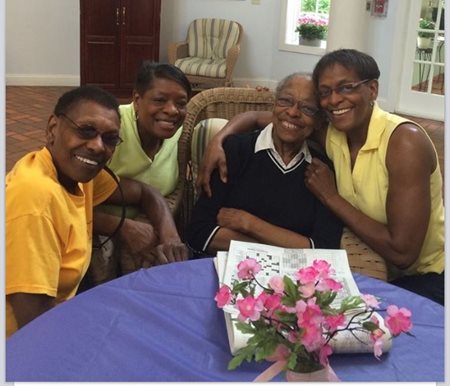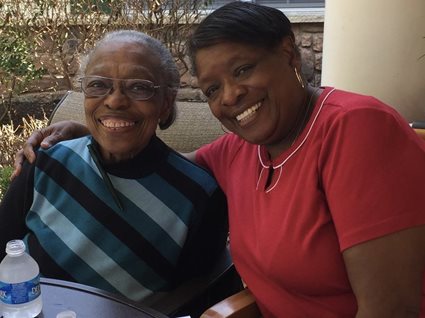
Double Your Impact for the Holidays
Double Your Impact for the Holidays
Your urgently needed year-end gift can go twice as far to provide care and support and accelerate Alzheimer's research this holiday season — and all year long. Show your giving spirit today during this 2x Match Challenge.
Donate Now“Teaching Is A Gift”: Alzheimer's Association Volunteer Shares What She’s Learned with Her Community
Volunteer community educator and TrialMatch volunteer participant Yolonda Simon lost her mother and her sister to Alzheimer’s, and today, another of her sisters is battling the disease. The retired teacher shares why education is key in the fight to end Alzheimer’s.
My mom was an amazing person, the kind of woman I would have liked, even if she wasn’t my mom. One day, while I was on vacation with my sisters, I called to check on my daughters, who were with my mother, and my oldest said: “Granny was acting kinda mean.” My brother agreed that something was going on, and we eventually learned that she had developed Alzheimer's, a disease that has touched my family many times since.
I grew up in Cairo, Illinois, the 11th of 12 children. When my mom was diagnosed with Alzheimer’s, I was still living and teaching in Carbondale, 60 miles away. My brother retired from his job in Chicago and moved back to Cairo. It was because of his retirement that he was available to take care of my mom. After her death, my mother’s brother also developed Alzheimer’s, and it was around that time that I went to an Alzheimer’s education presentation and learned about the opportunity to volunteer.
I thought that I would be volunteering by doing things like filing papers and stacking brochures. When I realized I would be receiving education so that I could meet people and help them to learn more about the disease, I knew I had found my niche. I thought: ‘This is a GIFT.’ I can do this for people I love and for others who most need the information. Volunteering with the Alzheimer’s Association allowed me to do that.
I like to talk, to laugh, and I love people. Being an Alzheimer’s educator has allowed me to better understand new things about experiences I had already lived, which is unique. In any educational situation, be it academic or in life, one can always learn. It is like eating watermelon. You eat the watermelon, but spit out the seeds. That which you can use, do; what you can’t, don’t. Keep what will work most for you. There are opportunities to learn around every corner.
Building a Community of Trust
When my mom was in the midst of her disease, my siblings, who were no longer local, trusted me and my brother to make decisions around our mom’s care, which we then shared with the rest of the family. Communication with the family was key, as it worked out beautifully for all of us. My siblings would help financially and would often come to visit my mom and give relief to my brother. I, too, would spend time in Cairo to provide respite care to my brother on Saturdays and during the summer when I was off work as an educator.
 Many caregivers think that they are the only person who can do the job, but that is simply not true. A network of support is needed. My family did not know this at the time, but our church community was so good at this. People would ask: ‘What can we do?’ Someone would bring us a meal, run errands for my brother, bring treats that my mother liked, or volunteer to just sit with my mom. Today, I tell people to make a list. Be ready when someone asks if you need help. Don't turn it away. At some point, you need it.
Many caregivers think that they are the only person who can do the job, but that is simply not true. A network of support is needed. My family did not know this at the time, but our church community was so good at this. People would ask: ‘What can we do?’ Someone would bring us a meal, run errands for my brother, bring treats that my mother liked, or volunteer to just sit with my mom. Today, I tell people to make a list. Be ready when someone asks if you need help. Don't turn it away. At some point, you need it.
It’s okay to talk about Alzheimer’s openly! I am willing to speak to one person or one crillion (yes!) people about this dreadful disease. I will take the time to educate anyone willing to listen. The way I see it, we are all blessed to be a blessing. I am blessed to have made it through my Alzheimer’s experiences with the knowledge I have. It is only right to bless others through education.
We all know that Alzheimer’s disease will progress. There WILL be some difficult, confusing, and sad moments, but the person you love living with this disease will sometimes do funny things sure to take moments to laugh. Laughter is indeed good for the soul AND for you and the person for whom you are caring. I wish that I had journaled about my experiences as I cared for my mom. Some of the moments are so tender, and at that moment you are so busy that you cannot fully appreciate it. Even if you can’t make the time to journal, write down the funny/tender/outstanding moments of the day with bullet points about what happened. You may want to look back at these moments one day, and your experience may be helpful to someone else.
I want to be an example. I know how hesitant people in the Black community can be to get involved, for reasons from distrust of the medical system to the question “What happens if…?” But as someone who has experienced Alzheimer's in my family, I know that the more you know, the better. Knowledge Is Power! So, I ask people: “Do you know the difference between Alzheimer’s and dementia?” If they say no, it is an invitation to share my story and knowledge.
 Having the ability to teach and share with others is a gift that has been given to me. It is indeed the purpose for which I feel that I’ve been called. I share Alzheimer’s Association resources along with my personal story, and I share the 24/7 Helpline number, carrying a card that gives my info and telling others that I will come and speak to them and their group. There is always someone at the 24/7 Helpline, whether you need to vent, connect to local resources, or just need someone to listen: 1.800.272.3900. Memorize the number! That’s my mantra!
Having the ability to teach and share with others is a gift that has been given to me. It is indeed the purpose for which I feel that I’ve been called. I share Alzheimer’s Association resources along with my personal story, and I share the 24/7 Helpline number, carrying a card that gives my info and telling others that I will come and speak to them and their group. There is always someone at the 24/7 Helpline, whether you need to vent, connect to local resources, or just need someone to listen: 1.800.272.3900. Memorize the number! That’s my mantra!
As I work with churches, sororities and any other group that will consent to a presentation, I know that we all need each other. Yes, I want to engage with as many people as I can about Alzheimer’s, wherever I go, but my local community is my target area. None of us can do this by ourselves. People need people. And to the best of my ability, I am here to help.
About: When she is not volunteering, Yolonda enjoys long walks, travel and genealogy. From a large family, she is interested in learning more about her grandparents, so she can share their history with her two grandchildren.
Photos in this post: 1. Yolonda with her sister Rubie, who passed of complications of Alzheimers in 2019. 2. Yolonda with her three sisters, Beatrice, Barbara and Rubie. 3. Yolonda's sisters Barbara and Rubie. Barbara, living with the disease, was diagnosed in 2019.

The first survivor of Alzheimer's is out there, but we won't get there without you.
Donate Now
Learn how Alzheimer’s disease affects the brain.
Take the Brain Tour
